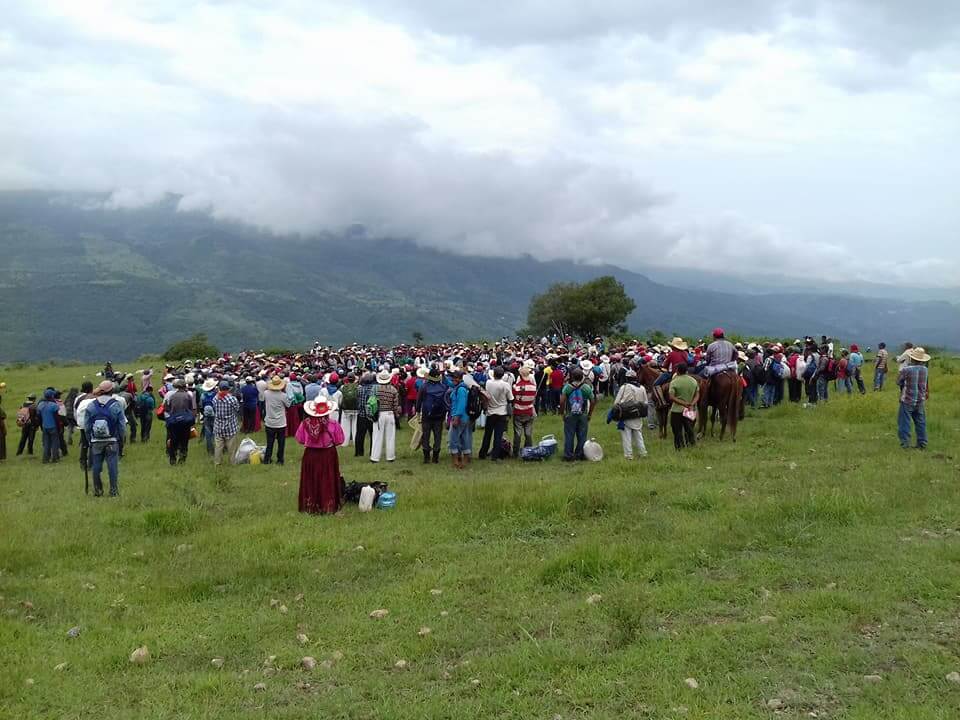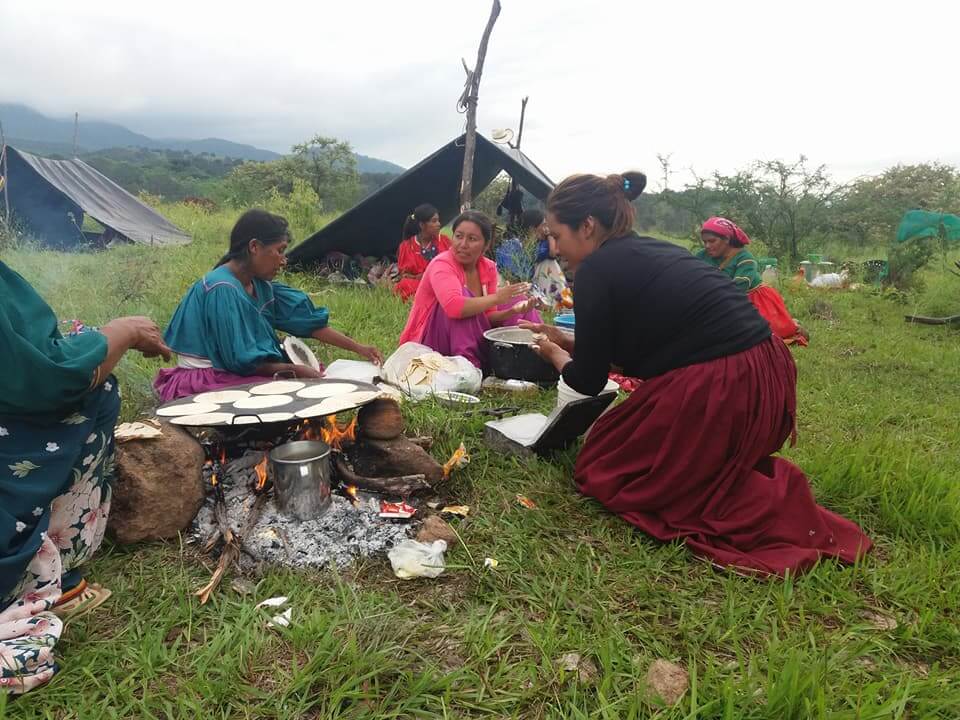
HUAJIMIC, Nayarit, Mexico — A century-old land conflict has flared up again in the Western Sierra Madre, deepening already raw tensions in the wake of the May 2017 assassination of two Huichol (Wixárika) leaders who fought to reclaim that land.
On Friday, the anniversary of last year’s equally contentious reclamation action, 1,200 indigenous Huichols, hiked for three hours down a mountain into the contested valley of Huajimic to meet the court officials scheduled to sign over to them a bitterly contested piece of farmland.
The officials never arrived, however, because ranchers opposing the restitution staged a roadblock, and police never showed up to enforce the action. Now the Huichols say they’ll stay put on the remote piece of farmland until the restitution is complete, setting the stage for a potentially violent standoff of uncertain duration.

Photo: Octaviano Díaz Chema
Friday’s restitution was to be the second in a series of legal procedures recognizing the wrongful possession of 10,500 hectares (nearly 26,000 acres) of Huichol land by the region’s mestizo ranchers more than 100 years ago.
The ranchers hold titles from the Mexican government dated around 1906, but the Huichol people hold land grants dating back to the 1700s from the Spanish crown.
Since last year’s hard-fought restitution, the leader of that effort, Miguel Vázquez Torres, was shot to death by a truck full of armed gunmen, as was his brother Agustin. Many suspect they were targeted because of their outspoken support of the land restitution.
On Sept. 22, 2016, after a series of lawsuits were decided in favor of the Huichol community of San Sebastián Teponohuaxtlán, they moved in to claim their first parcel, a 184-hectare (454-acre) hillside ranch about 5 miles from the ranching town of Huajimic. That action was followed with a roadblock and threats of violence. Since that time three Huichol families moved in to set up a homestead and begin farming, and faced repeated threats from residents of the nearby town of Huajimic.
This time, the contested tract is only 63.7 hectares (157 acres), but for the Huichol community, it represents the leading edge of their fight to reclaim their ancestral homelands. For the ranchers, it represents the line they must hold to prevent the dispossession of lands that have been in their families for generations.
The day before the scheduled restitution, local and state officials met in the Nayarit state capital of Tepic with Agrarian Tribunal Magistrate Aldo Saúl Muñoz López and assured him that public security forces would be present to prevent violence, said Cristián Chávez, a territorial expert representing the Huichol community of San Sebastian, who was present at the meeting and the subsequent roadblock.
The promised police forces never showed up, and a caravan including various court officials, a state human rights observer, attorneys and media representatives made their way through the hilly terrain, driving for more than an hour before confronting the roadblock. Several pickup trucks blocked the road and about 40 individuals were on the scene, said Chávez.
Magistrate Muñoz López got down from his truck and informed the ranchers that he was there to carry out an order from the court, and politely asked them to let the caravan pass, according to a report by Agustín del Castillo from Milenio newspaper. Ranchers flatly denied passage.
Given that there was no law enforcement present, Muñoz López drew up a document describing the circumstances that prevented the execution of justice, and expressed his intention to seek the means to follow through with the legal decision as soon as possible, said Chávez. He also reassured the ranchers that he would take their concerns to the authorities in the state and federal government.
Carlos González was visibly upset with the circumstances, according to del Castillo’s report. “We blame the governor of Nayarit, Antonio Echavarría, his secretary general of government and his attorney general, for the violence that could be caused by this situation, since 1,200 comuneros have come down to the property and taken possession of it, and given the traffic and food blockades on the part of the ranchers, the situation may become unsustainable,” he said with obvious annoyance.
The Mexican government has come under severe criticism for its lack of action in the case, rejecting repeated requests by Huichol leaders and ranchers alike to reimburse ranchers with federal funds designated to help prevent land conflicts.
The spokesman for Mexico’s Secretariat of Agrarian, Territorial and Urban Development, which is charged with resolving land disputes, said the agency lacks the resources to get involved and is already faced with more than 300 pending land conflicts.
Huichol representatives have taken their case directly to the public in videos posted on Facebook Saturday. They say they will continue to occupy the land until the court officials arrive and formalize the restitution. In one of them, a camera pans a massive crowd standing in a field, with mountains in the backdrop. Felipe Serio Chino, president of the community’s security council, steps forward.
“Today, Sept. 22, 2017, more than 1,000 comuneros (Huichol community members) gathered here in this place to demand of Magistrate Aldo Raul Muñoz López, who is in charge of Tribunal 56 in Tepic, Nayarit, that he deliver this land into our possession as it was programmed. All these comuneros are awaiting your presence. Without it, we will stay until we achieve the objective we came here for.
“We send a salute to Mr. Aldo but we also ask him not to be a coward, to not be afraid, to not allow anyone to prevent him from doing his duty… the law has recognized it; we are only demanding what is ours.”

Indigenous Peoples are putting their bodies on the line and it's our responsibility to make sure you know why. That takes time, expertise and resources - and we're up against a constant tide of misinformation and distorted coverage. By supporting IC you're empowering the kind of journalism we need, at the moment we need it most.